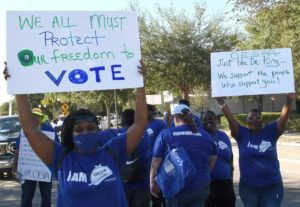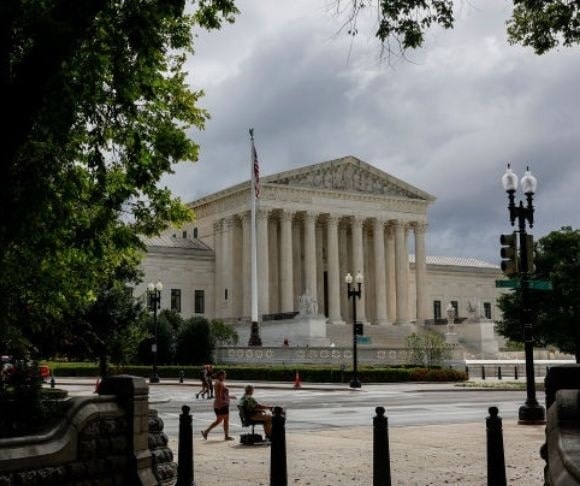The United States Supreme Court starts its new term Monday, Oct. 3. Cases will be tried before a public audience for the first time since March of 2020, and for the first time ever with a black woman on the bench. The term ahead already includes blockbuster cases on hot-button issues. Affirmative action in college admissions is on the docket, as is a case resembling 2018’s Masterpiece Cakeshop, which required a baker to make a cake for a gay wedding. It’s back, without the icing, along with much more ahead for the justices to hear. Two big cases will be argued in the opening week of the term, on voting rights and EPA authority.
Murky Waters
 First up is Sackett v. Environmental Protection Agency, where justices will rule on an Idaho couple’s efforts to build on their land. The Sacketts stand in for many landowners waiting to find out if their plots are worthless. They bought land by Priest Lake in Idaho and started to develop it after obtaining the necessary building permits. Then the EPA sent them a notice to stop and threatened fines of over $40,000 per day for noncompliance.
First up is Sackett v. Environmental Protection Agency, where justices will rule on an Idaho couple’s efforts to build on their land. The Sacketts stand in for many landowners waiting to find out if their plots are worthless. They bought land by Priest Lake in Idaho and started to develop it after obtaining the necessary building permits. Then the EPA sent them a notice to stop and threatened fines of over $40,000 per day for noncompliance.
The Sacketts’ property, the EPA said, is protected by the Clean Water Act, which prohibits the discharge of pollutants – including rocks and sand – into “navigable waters.” Under a broad reading of the Clean Water Act authored by Justice Anthony Kennedy, the Sacketts’ property is a wetland and worthless for development because it bears some undefined “significant nexus” with traditional navigable waters. In an alternative reading, authored by Justice Antonin Scalia, only those wetlands that have a continuous surface water connection to regulated waters may themselves be regulated.
Race and Voting Rights at SCOTUS
On Tuesday, the court hears a redistricting case from Alabama, called Merrill v. Milligan. Section 2 of the Voting Rights Act of 1965 prohibits voting practices or procedures that discriminate based on race, color, or language of minority groups. Evan Milligan, a progressive activist, has challenged Alabama’s redistricting plan for its seven seats in the House of Representatives. He won at the district court level, which found that since only one of the newly proposed districts was majority-minority (a district in which non-white voters make up the majority), it violated Section 2. The argument in favor of majority-minority districts suggests blacks will and should vote alike because of the color of their skin, and by removing from them the opportunity to vote as a race en masse, they will be denied the representation of someone with the same skin tone and, thus, ideas.

(Photo by Paul Hennessy/SOPA Images/LightRocket via Getty Images)
This case has attracted a massive following and outsized attention because of the political implications. Both sides are arguing for a high-minded analysis of the arguments, but at their elbows are the electoral realities driving the fight. If Milligan wins, that means more power for Democrats, and the opposite if Alabama’s Republicans can keep the districts they drew.
Race will feature throughout this term at the court, including a challenge to affirmative action in higher education that threatens the whole scheme. Presiding over it all will be a new justice, Ketanji Brown Jackson, the first black woman on the court.
Thin Blue Line Meets New Supreme Court Justice
Jackson has been serving as a justice since June. She has replaced Justice Stephen Breyer on the bench and as circuit justice for the 1st Circuit, in charge of reviewing emergency requests from courts in that region. The question remains whether she will be playing to the right or the left of Sonia Sotomayor. While the progressives would ascribe all her values based on skin color and chromosomes, others will wait until she speaks, writes, and rules to decide. The court is currently at 5-4, or 6-3, advantage conservative, depending on how one counts Chief Justice John Roberts. It’s a conservative court, likely to rule conservatively in most cases.
Justice Jackson will almost certainly fall to the left along the east-west axis of progressive versus conservative jurisprudence. What about the north-south line of libertarian versus authoritarian? That is more of an open question. She’s the niece of one uncle who was sentenced to life for a cocaine offense, while another was a lifelong law enforcer, including several years as chief of police for Miami. Jackson worked as a federal public defender for two years, not long after attending law school. The high court has three former prosecutors (Justices Samuel Alito, Sonia Sotomayor, and Neil Gorsuch) but no public defenders. Jackson testified during her confirmation: “There is a direct line from my defender service to what I do on the bench, and I think it’s beneficial.”




